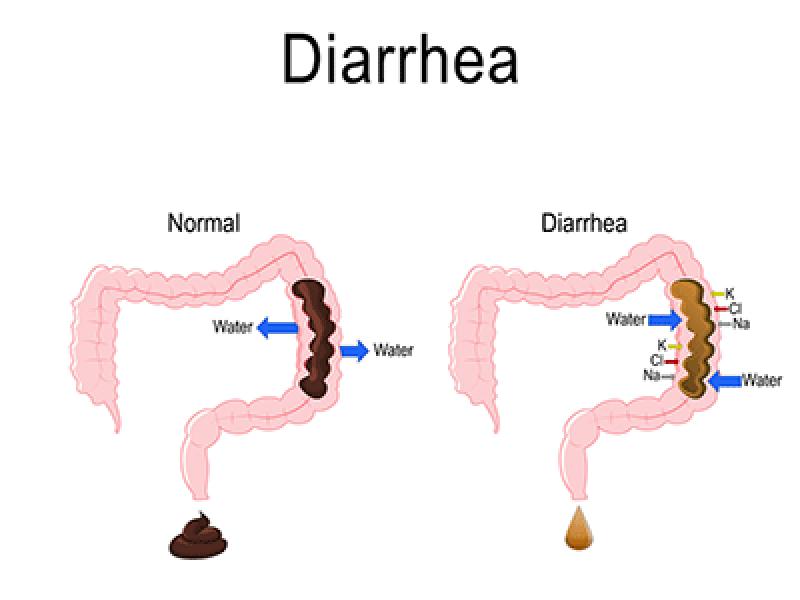Diarrhea is more frequent and more liquid bowel movements than normal. There are many causes. Diarrhea often is caused by an infection with bacteria, viruses or a parasite. Bacteria cause diarrhea either by invading the intestine or by producing a toxin that makes the intestine secrete more water. When the diarrhea is caused by food contaminated with bacteria or parasites, people often refer to this as food poisoning.
Fast facts on diarrhea
Here are some key points about diarrhea. More detail and supporting information is in the body of this article:
• Most cases of diarrhea are caused by bacteria, viruses, or parasites
• Inflammatory bowel diseases (IBD) including Crohn’s disease and ulcerative colitis can cause chronic diarrhea
• Antidiarrheal medications can reduce diarrheal output and zinc supplement is effective in children
Symptoms
Symptoms Signs and symptoms associated with diarrhea may include:
• Loose, watery stools
• Abdominal cramps
• Abdominal pain
• Fever
• Blood in the stool
• Bloating
• Nausea
• Urgent need to have a bowel movement
• Some nutritional and probiotic interventions may help prevent diarrhea
Frequent vomiting and diarrhea can lead to dehydration (abnormally low levels of body water) if too much fluid is lost from the body. Signs of dehydration include:
• Dry eyes
• Infrequent urination
• Dry mouth
• Thirst

Causes
A number of diseases and conditions can cause diarrhea, including:
• Viruses: Viruses that can cause diarrhea include Norwalk virus, cytomegalovirus and viral hepatitis. Rotavirus is a common cause of acute childhood diarrhea.
• Bacteria and parasites: Contaminated food or water can transmit bacteria and parasites to your body. Parasites such as Giardia lamblia and cryptosporidium can cause diarrhea. Common bacterial causes of diarrhea include campylobacter, salmonella, shigella and Escherichia coli. When traveling in developing countries, diarrhea caused by bacteria and parasites is often called traveler’s diarrhea. Clostridium difficile infection can occur, especially after a course of antibiotics.
• Medications: Many medications, such as antibiotics, can cause diarrhea. Antibiotics destroy both good and bad bacteria, which can disturb the natural balance of bacteria in your intestines. Other drugs that cause diarrhea are cancer drugs and antacids with magnesium.
• Lactose intolerance: Lactose is a sugar found in milk and other dairy products. People who have difficulty digesting lactose have diarrhea after eating dairy products. Your body makes an enzyme that helps digest lactose, but for most people, the levels of this enzyme drop off rapidly after childhood. This causes an increased risk of lactose intolerance as you age.
• Fructose: Fructose, a sugar found naturally in fruits and honey and added as a sweetener to some beverages, can cause diarrhea in people who have trouble digesting it.
• Artificial sweeteners: Sorbitol and mannitol, artificial sweeteners found in chewing gum and other sugar-free products, can cause diarrhea in some otherwise healthy people.
• Surgery: Some people have diarrhea after undergoing abdominal surgery or gallbladder removal surgery.
• Other digestive disorders: Chronic diarrhea has a number of other causes, such as Crohn’s disease, ulcerative colitis, celiac disease, microscopic colitis and irritable bowel syndrome.
Prevention
Preventing viral diarrhea; Wash your hands to prevent the spread of viral diarrhea.
To ensure adequate hand-washing:• Wash frequently. Wash your hands before and after preparing food. Wash your hands after handling uncooked meat, using the toilet, changing diapers, sneezing, coughing and blowing your nose.
• Lather with soap for at least 20 seconds. After putting soap on your hands, rub your hands together for at least 20 seconds. This is about as long as it takes to sing “Happy Birthday” twice through.
• Use hand sanitizer when washing isn’t possible. Use an alcohol-based hand sanitizer when you can’t get to a sink. Apply the hand sanitizer as you would hand lotion, making sure to cover the fronts and backs of both hands. Use a product that contains at least 60 percent alcohol.
Diagnosis
Besides conducting a physical exam and reviewing your medications, your doctor might order tests to determine what’s causing your diarrhea.
They include:
• Blood test. A complete blood count test can help determine what’s causing your diarrhea.
• Stool test. Your doctor might recommend a stool test to determine whether a bacterium or parasite is causing your diarrhea.
• Flexible sigmoidoscopy or colonoscopy. Your doctor might recommend one of these procedures to look at the lining of your colon and provide biopsies if no cause is evident for persistent diarrhea.
Both procedures involve using a thin, lighted tube with a lens on the end to look inside your colon.
Treatment
When symptoms start, try to rest more and switch to a diet of clear liquids. Drink water, juice, bouillon and weak tea to avoid becoming dehydrated. Replace lost fluids and electrolytes with sports drinks. Avoid coffee or soft drinks that contain caffeine, since caffeine increases the loss of water and salt. If you have nausea in addition to diarrhea, take very small sips of fluid frequently and suck on ice chips.
As you begin to feel better, start eating solid foods gradually to prevent stomach cramps. Start with soft, starchy foods (cooked cereal, steamed rice, unbuttered toast, and applesauce) before returning to your normal diet. To ease stomach cramps, apply warmth (a hot water bottle, warm compress or electric heating pad set on low heat) to your abdomen.